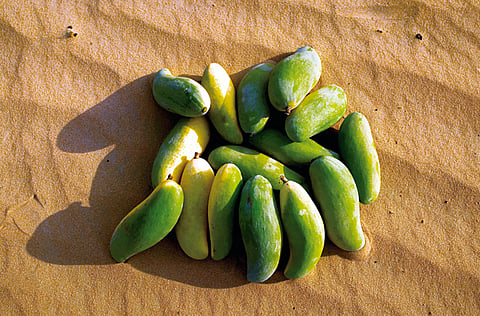Locally transpiring miracles
Organic farming is slowly gaining ground in the UAE as residents and restaurants demand fresh local produce, but is the idea environmentally sustainable?

Scorchingly hot, sandy and with virtually no rainfall, it is only natural that many people believe food cannot be grown in the desert. Yet, slowly but surely, UAE farmers are meeting an increasing demand for local produce.
More than half a dozen local farmers can be found displaying their wares at the regular Farmer’s Market on the Terrace at Dubai’s Souk Al Bahar mall, which offers fresh local and organic seasonal produce to the general public at surprisingly low prices. After a third season, the popular market now also runs at the Dubai Marina promenade.
Seasonal shoppers
Every Saturday during the UAE growing season, from November to May, shoppers crowd the venues in search of ripe red cherry tomatoes, fresh green lettuce, spinach and fragrant herbs, and depending on the availability and season, fruit such as melons and strawberries. With an estimated 38,500 fruit and vegetable farms, the UAE even exports high-quality produce, dates being the most famous.
But the biggest limitation for the food retail sector is the unbearable, crop-unfriendly summer, from June to October. Organisations such as Salata Farms, however, fill in this gap by using hydroponic technology (growing plants in sand, with added nutrients) to grow fresh produce all year round, while others turn to temperature-controlled greenhouses.
Yael Mejia, Owner of Baker’s and Spice, and Founder of the Farmer’s Market on the Terrace, does without or goes regional when local foods are not available. “We let the produce we can get dictate the menus, not the other way around,” she says. Agrees Chef Michael Wunsch, Managing Director of Barakat, a supplier of fresh juices, fruits and vegetables: “We’d prefer to use local but there’s not enough quantity and quality available,” he says. At such times, Barakat sources its produce from Oman, Jordan, Iran, Lebanon and Saudi Arabia.
“There’s still a perception in the UAE that local produce is low quality,” says Yael. A survey by Al Aan TV last year found that 23 per cent of UAE residents believe imported food is of higher quality. A representative from Spinneys supermarket, which has a local produce section and a wide range of imported fruit and vegetables, says, “Imported products still remain a firm favourite with our customers because of the quality, variety and taste.”
However, the trend towards local food remains upwards, according to the study. A notable 65 per cent of respondents buy food grown or raised locally. And the term ‘locavore’, added to the Oxford Dictionary in 2007, is being used to describe them. Yet the UAE still imports more than 80 per cent of its food.
Higher footprint
Perhaps this is because, rather surprisingly, locally grown foods can have a higher carbon footprint. As Nils El Accad of the Organics Foods and Cafe points out, most UAE farmers use desalinated water to irrigate their crops, which uses enormous amounts of energy and destroys marine environments due to excess brine pumped into the Gulf. Chef Wunsch of Barakat agrees, saying, “Most of the farms do not have the facility to use recycled water from the Municipality, and are forced to use drinking water, which is expensive and not sustainable environmentally.”
Ex-General Manager of Nazwa Organic Farm, Elena Kinane, with more than seven years of farming experience in the UAE, believes water retention is possible. “Composting and manure help the soil act like a sponge — retaining water while enriching the soil. Drip-irrigation can also reduce water consumption by up to two-thirds.” Other strategies that conserve water include reusing grey water, harvesting any available rainwater and enforcing stricter water conservation rules. Growing in greenhouses during summer also reduces water evaporation.
Eat local, eat fresh
Becky Balderstone, founder of local organic foods supplier Ripe, is passionate about going organic and making fresh, local produce easily accessible and affordable for all. “There’s an increased demand for not only local food, but food that tastes good because it is fresh,” she says.
Yael Mejia has been using fresh local produce in Baker’s & Spice kitchens since she brought the concept to Dubai in 2009. “When we first started using the crops in our kitchens we thought they were too good to keep a secret. We wanted the public who share our concerns regarding the future of global warming to be able to vote with their wallets and enjoy the best produce available around the UAE,” says Yael. “There was also the concern that organic produce flown in from around the world wasn’t very fresh by the time it arrived in the kitchen.”
Growing local produce increases food security. The first Farmer’s Market coincided with the volcano eruption in Iceland, which meant that no produce came from Europe for days. “There was an important point to be made and we made it. The farmers really pulled out all the stops and the first markets were spectacular,” says Yael.
The market started with three farmers. It now has six to eight farmers weekly. “The more customers support and buy from the market, the greater the enthusiasm, and more and more farmers will try out new crops.”
Organic partnerships
In regular attendance at the Farmer’s Market, Abu Dhabi Organic Farms supplies local, organic produce directly to consumers. Mazaraa, the operation’s retail arm in Abu Dhabi, has partnered with Etihad Airways to provide fresh, organic produce to enhance their in-flight First Class dining menus.
Ripe has partnered with Jones the Grocer to launch a new organic farmers market in the capital, and also plans to open a farm shop in Dubai. “I anticipate that the farming industry trend will move to more organic farming and I know a number of farms working towards organic certification as they understand the benefits of this. The farmers in this region are extremely knowledgeable and talented to be producing such beautiful produce under such extreme growing conditions,” says Balderstone.



